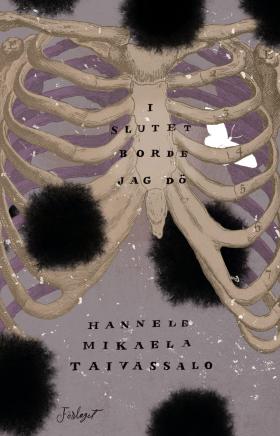
I slutet borde jag dö
(This Should End with My Death)
by Hannele Mikaela Taivassalo
reviewed by Željka Černok
The first thing that needs to be said: Oh, how Taivassalo can write.
In fact, Finland-Swedish literature boasts a disproportionate number of excellent writers. Some of them are, in my head at least, filed under ‘Magicians with words’, and Taivassalo certainly belongs in this category, together with Mikaela Strömberg, Susanne Ringell, Malin Kivelä and Sanna Tahvanainen; each with their own unique style and each one of them incredibly good at making us understand the characters without just plainly describing them. They are also fantastic at conjuring up the atmosphere in just a few, seemingly insignificant details. Their sentences might seem to be nonchalantly pirouetting, darkly humorous and poetic, but all the time readers feel that they are in the safe hands of a capable writer. A writer who knows exactly where to take us and how to seduce us with an occasional knowing wink that takes the story one step further than expected. It is a joy to read their glittering prose, no matter what they are writing about.
And in this novel, Taivassalo writes about an impossible relationship with a married man. An impossible relationship but a relationship nonetheless. A self-ironic wink from the storyteller at the very beginning: ‘If there’s a moral to this story then we know how it all should end. This should end with my death, as in a punishment, at the same time. Everything else would fall into place.’ Straight away we know there will be no self-pity here, no moaning. And so it continues, with almost a diary-like intimacy, in fragmentary writing, we follow this woman in love enjoying her relationship, but also mercilessly dissecting it. She is enchanted, spirited away when she is with him, hoping that they might end up together, so close and connected do they feel. But he has a wife and his wife gets pregnant and he has made it clear from the start that he will not leave his wife, but our storyteller is still hoping and is angry with herself for hoping. Is the relationship meaningless or hopeless? ‘How to believe in the truthfulness of your relationship if it is possible only by lying to another person?’ All of these things are pondered on, all of these problems our main character is aware of, her thoughts looping in narrower and narrower circles, hoping to reach some conclusion and inner truth at the end. ‘Who is this person I should be all the time? And do I have to?’
It is wonderful and really fascinating how Taivassalo can present this swirl of thoughts so clearly. How she makes it sound tenderly poetic and wise, using such simple statements. How she weaves those dark landscapes of a tortured soul, where repetitions will eventually, hopefully, give birth to the quivering truth. How the desperate main character slowly becomes more and more aware of her inner strength and chooses herself at the end.
This is a gorgeous little novel, original in style and presented in a voice that is at the same time fragile and strong. It would be a pity if it wasn´t more widely read.

I slutet borde jag dö
Förlaget M, 2020.
150 pages.
Foreign rights: Rights and Brands Agency.
Hannele Mikaela Taivassalo has published novels, short stories and children´s books. Her novel Fem knivar hade Andrej Krapl (Five Knives Had Andrej Krapl) from 2007 (reviewed in SBR 2008:2) won the Runeberg prize and her novel In Transit (reviewed in SBR 2017:1) has been turned into an opera. Translated extracts from two novels have appeared in SBR: Starved (Svulten) in 2013 and Oh Come and Look at This (Åh, kom och se här) in 2011:1, both translated by Sarah Death.
